Entrepreneurship and Small Business Management
VerifiedAdded on 2023/01/10
|19
|5212
|47
AI Summary
This document provides an overview of entrepreneurship and small business management, including the types of entrepreneurial ventures and their relationship with typology of entrepreneurship. It also discusses the impact of micro and small businesses on the economy, the characteristics and skills of successful entrepreneurs, and the importance of small businesses and startups for social economy growth.
Contribute Materials
Your contribution can guide someone’s learning journey. Share your
documents today.

ENTREPRENEURSHIP
AND SMALL BUSINESS
MANAGEMENT
AND SMALL BUSINESS
MANAGEMENT
Secure Best Marks with AI Grader
Need help grading? Try our AI Grader for instant feedback on your assignments.

TABLE OF CONTENTS
INTRODUCTION...........................................................................................................................................3
MAIN BODY..................................................................................................................................................3
LO 1..............................................................................................................................................................3
P1 Types of Entrepreneurial ventures and their relationship with typology of entrepreneurship..........3
P2 Similarities and differences between entrepreneurial ventures.........................................................5
LO 2..............................................................................................................................................................7
P3 Relevant data illustrating impact of micro and small business on economy......................................7
P4 Importance of small business and startups for growth of social economy.......................................11
LO 3............................................................................................................................................................12
P5 Characteristics traits and skills of successful Entrepreneurs differentiating them from other
business managers................................................................................................................................12
P6 The way Entrepreneurial aspects personality reflect their motivation and mindset........................14
LO 4............................................................................................................................................................16
P7 The way background and experience can hinder or foster entrepreneurship..................................16
CONCLUSION.............................................................................................................................................17
REFERENCES..............................................................................................................................................18
INTRODUCTION...........................................................................................................................................3
MAIN BODY..................................................................................................................................................3
LO 1..............................................................................................................................................................3
P1 Types of Entrepreneurial ventures and their relationship with typology of entrepreneurship..........3
P2 Similarities and differences between entrepreneurial ventures.........................................................5
LO 2..............................................................................................................................................................7
P3 Relevant data illustrating impact of micro and small business on economy......................................7
P4 Importance of small business and startups for growth of social economy.......................................11
LO 3............................................................................................................................................................12
P5 Characteristics traits and skills of successful Entrepreneurs differentiating them from other
business managers................................................................................................................................12
P6 The way Entrepreneurial aspects personality reflect their motivation and mindset........................14
LO 4............................................................................................................................................................16
P7 The way background and experience can hinder or foster entrepreneurship..................................16
CONCLUSION.............................................................................................................................................17
REFERENCES..............................................................................................................................................18
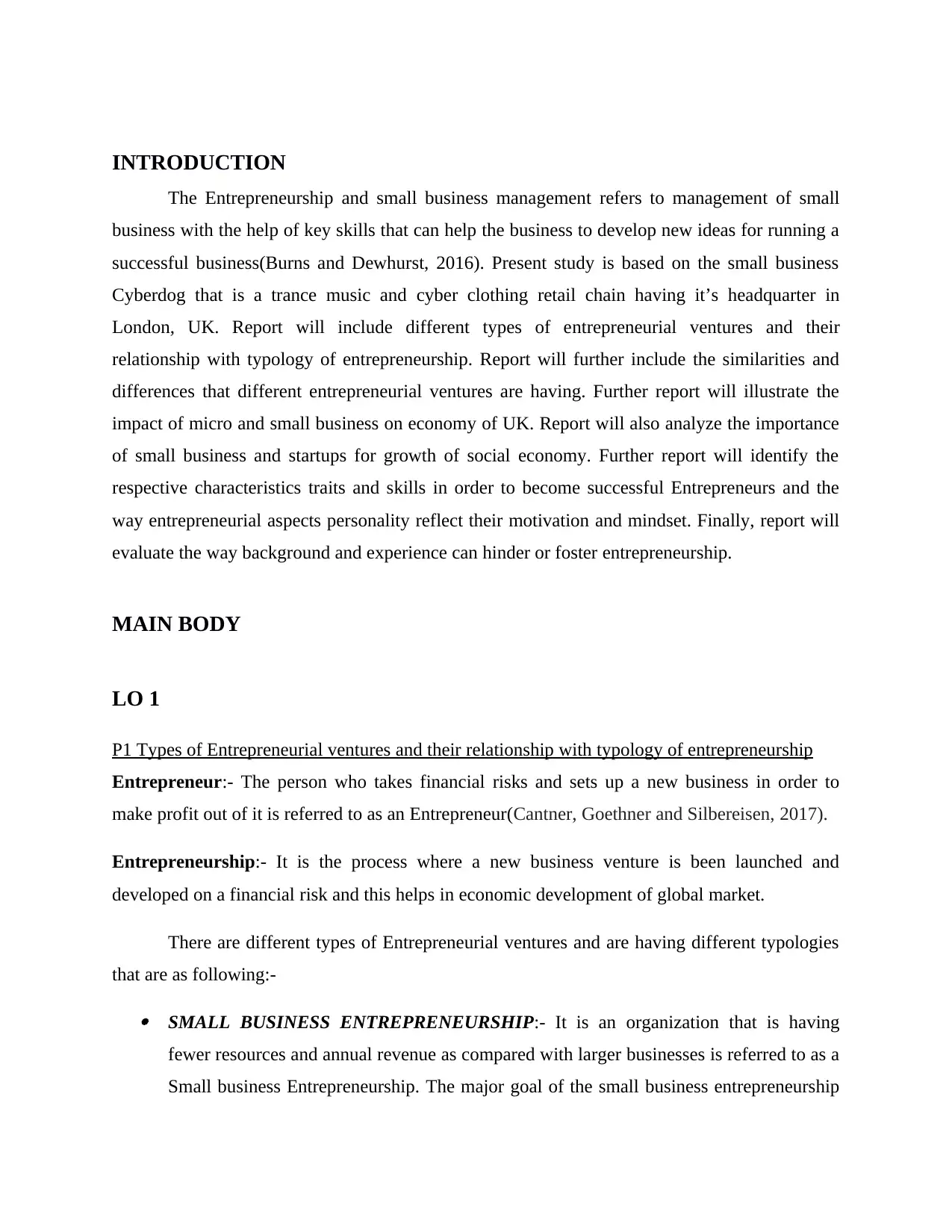
INTRODUCTION
The Entrepreneurship and small business management refers to management of small
business with the help of key skills that can help the business to develop new ideas for running a
successful business(Burns and Dewhurst, 2016). Present study is based on the small business
Cyberdog that is a trance music and cyber clothing retail chain having it’s headquarter in
London, UK. Report will include different types of entrepreneurial ventures and their
relationship with typology of entrepreneurship. Report will further include the similarities and
differences that different entrepreneurial ventures are having. Further report will illustrate the
impact of micro and small business on economy of UK. Report will also analyze the importance
of small business and startups for growth of social economy. Further report will identify the
respective characteristics traits and skills in order to become successful Entrepreneurs and the
way entrepreneurial aspects personality reflect their motivation and mindset. Finally, report will
evaluate the way background and experience can hinder or foster entrepreneurship.
MAIN BODY
LO 1
P1 Types of Entrepreneurial ventures and their relationship with typology of entrepreneurship
Entrepreneur:- The person who takes financial risks and sets up a new business in order to
make profit out of it is referred to as an Entrepreneur(Cantner, Goethner and Silbereisen, 2017).
Entrepreneurship:- It is the process where a new business venture is been launched and
developed on a financial risk and this helps in economic development of global market.
There are different types of Entrepreneurial ventures and are having different typologies
that are as following:-
SMALL BUSINESS ENTREPRENEURSHIP:- It is an organization that is having
fewer resources and annual revenue as compared with larger businesses is referred to as a
Small business Entrepreneurship. The major goal of the small business entrepreneurship
The Entrepreneurship and small business management refers to management of small
business with the help of key skills that can help the business to develop new ideas for running a
successful business(Burns and Dewhurst, 2016). Present study is based on the small business
Cyberdog that is a trance music and cyber clothing retail chain having it’s headquarter in
London, UK. Report will include different types of entrepreneurial ventures and their
relationship with typology of entrepreneurship. Report will further include the similarities and
differences that different entrepreneurial ventures are having. Further report will illustrate the
impact of micro and small business on economy of UK. Report will also analyze the importance
of small business and startups for growth of social economy. Further report will identify the
respective characteristics traits and skills in order to become successful Entrepreneurs and the
way entrepreneurial aspects personality reflect their motivation and mindset. Finally, report will
evaluate the way background and experience can hinder or foster entrepreneurship.
MAIN BODY
LO 1
P1 Types of Entrepreneurial ventures and their relationship with typology of entrepreneurship
Entrepreneur:- The person who takes financial risks and sets up a new business in order to
make profit out of it is referred to as an Entrepreneur(Cantner, Goethner and Silbereisen, 2017).
Entrepreneurship:- It is the process where a new business venture is been launched and
developed on a financial risk and this helps in economic development of global market.
There are different types of Entrepreneurial ventures and are having different typologies
that are as following:-
SMALL BUSINESS ENTREPRENEURSHIP:- It is an organization that is having
fewer resources and annual revenue as compared with larger businesses is referred to as a
Small business Entrepreneurship. The major goal of the small business entrepreneurship
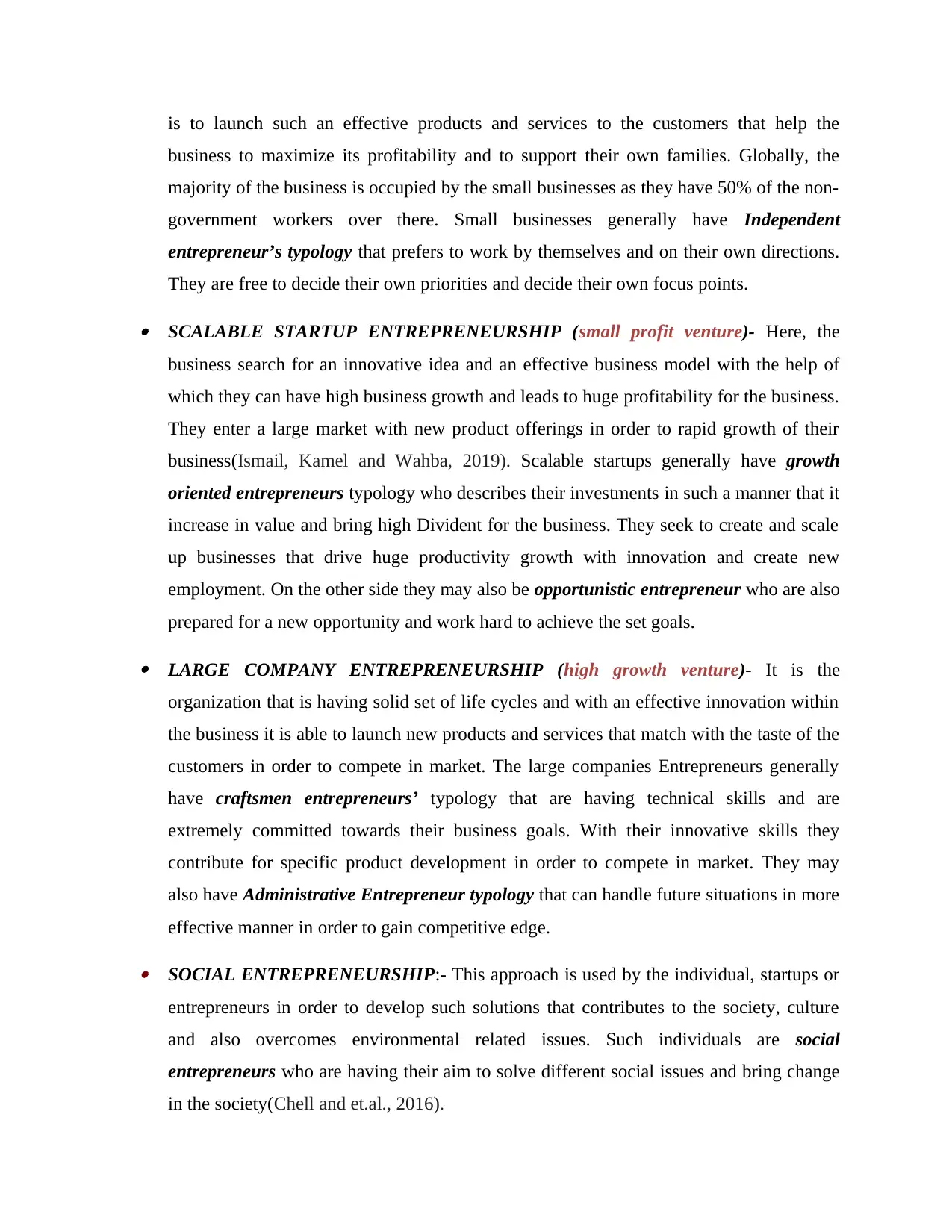
is to launch such an effective products and services to the customers that help the
business to maximize its profitability and to support their own families. Globally, the
majority of the business is occupied by the small businesses as they have 50% of the non-
government workers over there. Small businesses generally have Independent
entrepreneur’s typology that prefers to work by themselves and on their own directions.
They are free to decide their own priorities and decide their own focus points.
SCALABLE STARTUP ENTREPRENEURSHIP (small profit venture)- Here, the
business search for an innovative idea and an effective business model with the help of
which they can have high business growth and leads to huge profitability for the business.
They enter a large market with new product offerings in order to rapid growth of their
business(Ismail, Kamel and Wahba, 2019). Scalable startups generally have growth
oriented entrepreneurs typology who describes their investments in such a manner that it
increase in value and bring high Divident for the business. They seek to create and scale
up businesses that drive huge productivity growth with innovation and create new
employment. On the other side they may also be opportunistic entrepreneur who are also
prepared for a new opportunity and work hard to achieve the set goals.
LARGE COMPANY ENTREPRENEURSHIP (high growth venture)- It is the
organization that is having solid set of life cycles and with an effective innovation within
the business it is able to launch new products and services that match with the taste of the
customers in order to compete in market. The large companies Entrepreneurs generally
have craftsmen entrepreneurs’ typology that are having technical skills and are
extremely committed towards their business goals. With their innovative skills they
contribute for specific product development in order to compete in market. They may
also have Administrative Entrepreneur typology that can handle future situations in more
effective manner in order to gain competitive edge.
SOCIAL ENTREPRENEURSHIP:- This approach is used by the individual, startups or
entrepreneurs in order to develop such solutions that contributes to the society, culture
and also overcomes environmental related issues. Such individuals are social
entrepreneurs who are having their aim to solve different social issues and bring change
in the society(Chell and et.al., 2016).
business to maximize its profitability and to support their own families. Globally, the
majority of the business is occupied by the small businesses as they have 50% of the non-
government workers over there. Small businesses generally have Independent
entrepreneur’s typology that prefers to work by themselves and on their own directions.
They are free to decide their own priorities and decide their own focus points.
SCALABLE STARTUP ENTREPRENEURSHIP (small profit venture)- Here, the
business search for an innovative idea and an effective business model with the help of
which they can have high business growth and leads to huge profitability for the business.
They enter a large market with new product offerings in order to rapid growth of their
business(Ismail, Kamel and Wahba, 2019). Scalable startups generally have growth
oriented entrepreneurs typology who describes their investments in such a manner that it
increase in value and bring high Divident for the business. They seek to create and scale
up businesses that drive huge productivity growth with innovation and create new
employment. On the other side they may also be opportunistic entrepreneur who are also
prepared for a new opportunity and work hard to achieve the set goals.
LARGE COMPANY ENTREPRENEURSHIP (high growth venture)- It is the
organization that is having solid set of life cycles and with an effective innovation within
the business it is able to launch new products and services that match with the taste of the
customers in order to compete in market. The large companies Entrepreneurs generally
have craftsmen entrepreneurs’ typology that are having technical skills and are
extremely committed towards their business goals. With their innovative skills they
contribute for specific product development in order to compete in market. They may
also have Administrative Entrepreneur typology that can handle future situations in more
effective manner in order to gain competitive edge.
SOCIAL ENTREPRENEURSHIP:- This approach is used by the individual, startups or
entrepreneurs in order to develop such solutions that contributes to the society, culture
and also overcomes environmental related issues. Such individuals are social
entrepreneurs who are having their aim to solve different social issues and bring change
in the society(Chell and et.al., 2016).
Secure Best Marks with AI Grader
Need help grading? Try our AI Grader for instant feedback on your assignments.
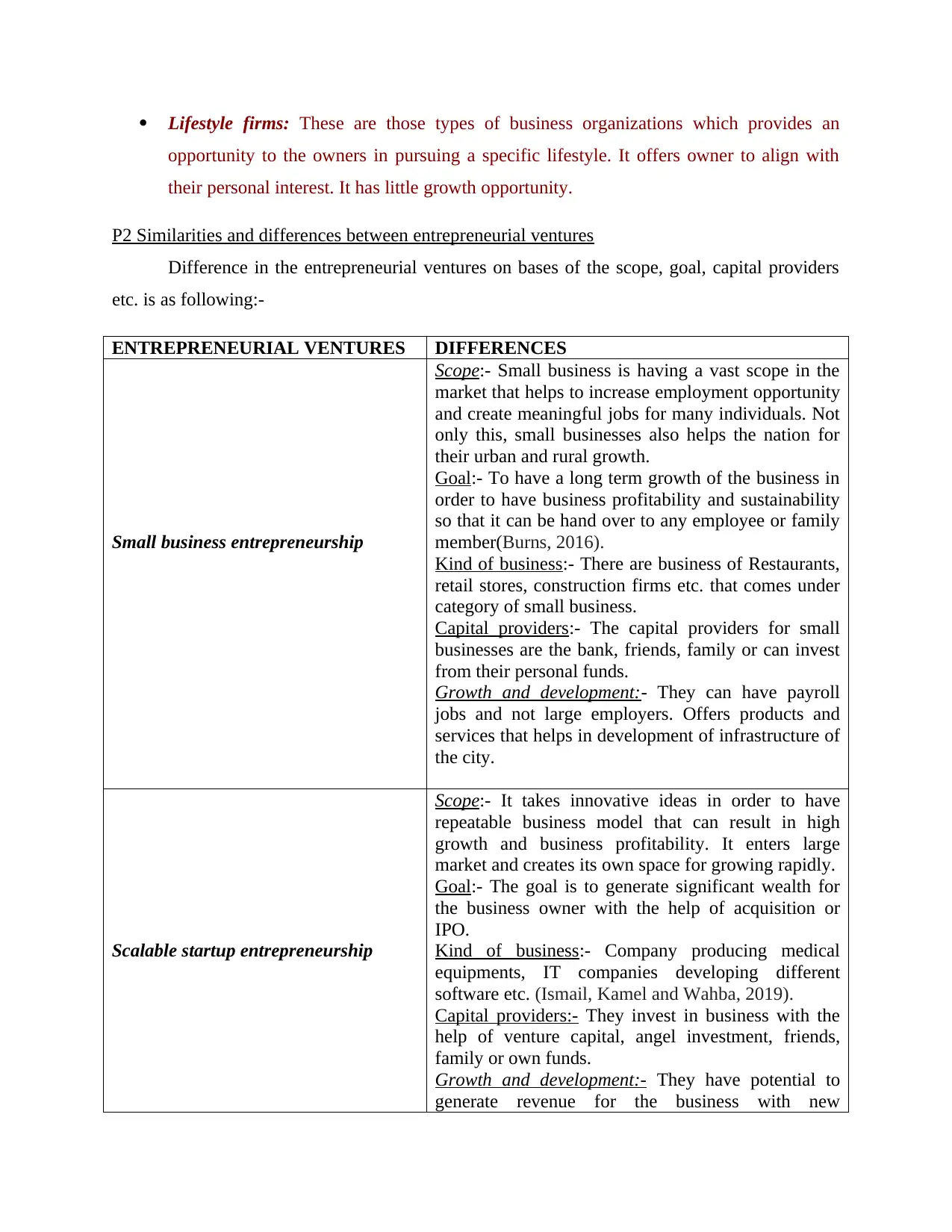
Lifestyle firms: These are those types of business organizations which provides an
opportunity to the owners in pursuing a specific lifestyle. It offers owner to align with
their personal interest. It has little growth opportunity.
P2 Similarities and differences between entrepreneurial ventures
Difference in the entrepreneurial ventures on bases of the scope, goal, capital providers
etc. is as following:-
ENTREPRENEURIAL VENTURES DIFFERENCES
Small business entrepreneurship
Scope:- Small business is having a vast scope in the
market that helps to increase employment opportunity
and create meaningful jobs for many individuals. Not
only this, small businesses also helps the nation for
their urban and rural growth.
Goal:- To have a long term growth of the business in
order to have business profitability and sustainability
so that it can be hand over to any employee or family
member(Burns, 2016).
Kind of business:- There are business of Restaurants,
retail stores, construction firms etc. that comes under
category of small business.
Capital providers:- The capital providers for small
businesses are the bank, friends, family or can invest
from their personal funds.
Growth and development:- They can have payroll
jobs and not large employers. Offers products and
services that helps in development of infrastructure of
the city.
Scalable startup entrepreneurship
Scope:- It takes innovative ideas in order to have
repeatable business model that can result in high
growth and business profitability. It enters large
market and creates its own space for growing rapidly.
Goal:- The goal is to generate significant wealth for
the business owner with the help of acquisition or
IPO.
Kind of business:- Company producing medical
equipments, IT companies developing different
software etc. (Ismail, Kamel and Wahba, 2019).
Capital providers:- They invest in business with the
help of venture capital, angel investment, friends,
family or own funds.
Growth and development:- They have potential to
generate revenue for the business with new
opportunity to the owners in pursuing a specific lifestyle. It offers owner to align with
their personal interest. It has little growth opportunity.
P2 Similarities and differences between entrepreneurial ventures
Difference in the entrepreneurial ventures on bases of the scope, goal, capital providers
etc. is as following:-
ENTREPRENEURIAL VENTURES DIFFERENCES
Small business entrepreneurship
Scope:- Small business is having a vast scope in the
market that helps to increase employment opportunity
and create meaningful jobs for many individuals. Not
only this, small businesses also helps the nation for
their urban and rural growth.
Goal:- To have a long term growth of the business in
order to have business profitability and sustainability
so that it can be hand over to any employee or family
member(Burns, 2016).
Kind of business:- There are business of Restaurants,
retail stores, construction firms etc. that comes under
category of small business.
Capital providers:- The capital providers for small
businesses are the bank, friends, family or can invest
from their personal funds.
Growth and development:- They can have payroll
jobs and not large employers. Offers products and
services that helps in development of infrastructure of
the city.
Scalable startup entrepreneurship
Scope:- It takes innovative ideas in order to have
repeatable business model that can result in high
growth and business profitability. It enters large
market and creates its own space for growing rapidly.
Goal:- The goal is to generate significant wealth for
the business owner with the help of acquisition or
IPO.
Kind of business:- Company producing medical
equipments, IT companies developing different
software etc. (Ismail, Kamel and Wahba, 2019).
Capital providers:- They invest in business with the
help of venture capital, angel investment, friends,
family or own funds.
Growth and development:- They have potential to
generate revenue for the business with new
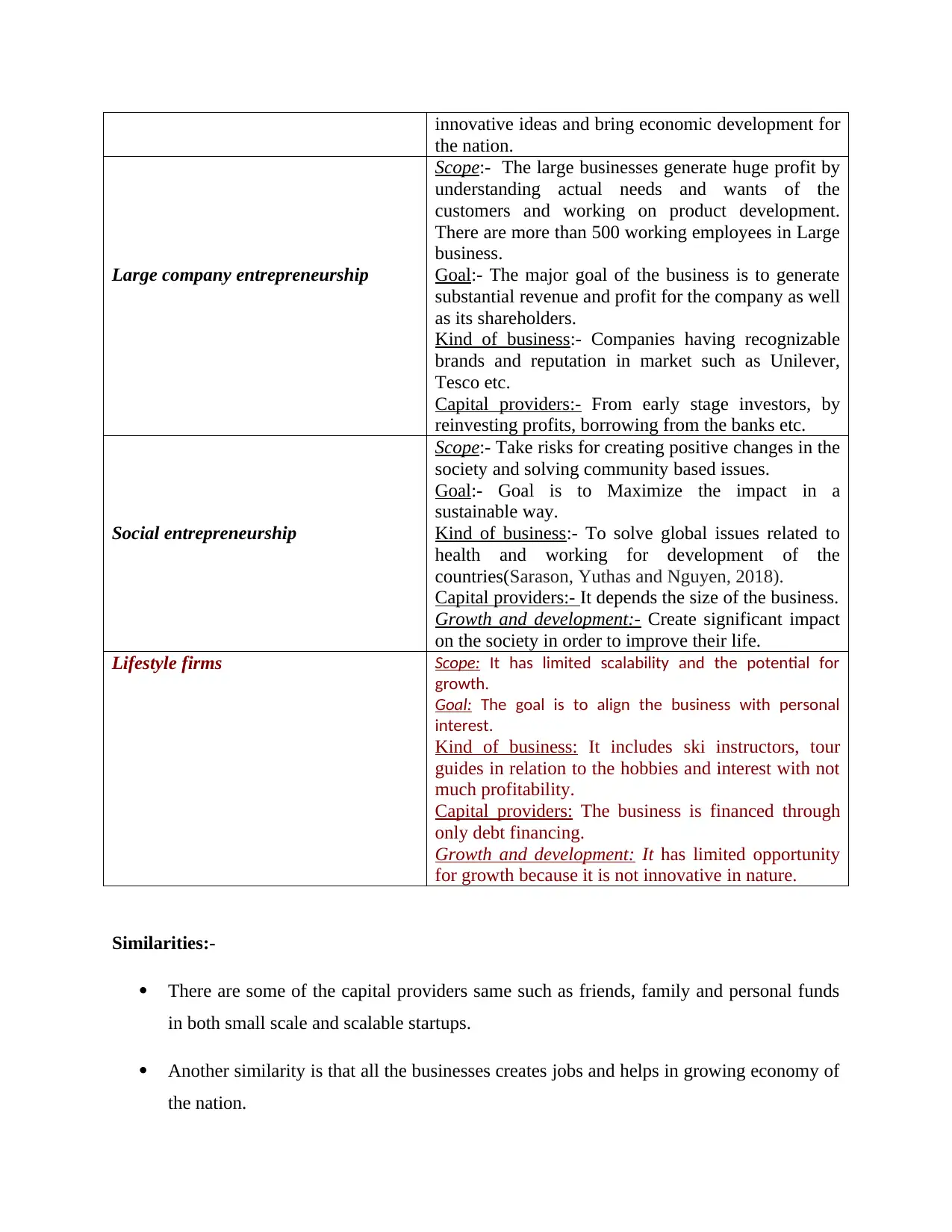
innovative ideas and bring economic development for
the nation.
Large company entrepreneurship
Scope:- The large businesses generate huge profit by
understanding actual needs and wants of the
customers and working on product development.
There are more than 500 working employees in Large
business.
Goal:- The major goal of the business is to generate
substantial revenue and profit for the company as well
as its shareholders.
Kind of business:- Companies having recognizable
brands and reputation in market such as Unilever,
Tesco etc.
Capital providers:- From early stage investors, by
reinvesting profits, borrowing from the banks etc.
Social entrepreneurship
Scope:- Take risks for creating positive changes in the
society and solving community based issues.
Goal:- Goal is to Maximize the impact in a
sustainable way.
Kind of business:- To solve global issues related to
health and working for development of the
countries(Sarason, Yuthas and Nguyen, 2018).
Capital providers:- It depends the size of the business.
Growth and development:- Create significant impact
on the society in order to improve their life.
Lifestyle firms Scope: It has limited scalability and the potential for
growth.
Goal: The goal is to align the business with personal
interest.
Kind of business: It includes ski instructors, tour
guides in relation to the hobbies and interest with not
much profitability.
Capital providers: The business is financed through
only debt financing.
Growth and development: It has limited opportunity
for growth because it is not innovative in nature.
Similarities:-
There are some of the capital providers same such as friends, family and personal funds
in both small scale and scalable startups.
Another similarity is that all the businesses creates jobs and helps in growing economy of
the nation.
the nation.
Large company entrepreneurship
Scope:- The large businesses generate huge profit by
understanding actual needs and wants of the
customers and working on product development.
There are more than 500 working employees in Large
business.
Goal:- The major goal of the business is to generate
substantial revenue and profit for the company as well
as its shareholders.
Kind of business:- Companies having recognizable
brands and reputation in market such as Unilever,
Tesco etc.
Capital providers:- From early stage investors, by
reinvesting profits, borrowing from the banks etc.
Social entrepreneurship
Scope:- Take risks for creating positive changes in the
society and solving community based issues.
Goal:- Goal is to Maximize the impact in a
sustainable way.
Kind of business:- To solve global issues related to
health and working for development of the
countries(Sarason, Yuthas and Nguyen, 2018).
Capital providers:- It depends the size of the business.
Growth and development:- Create significant impact
on the society in order to improve their life.
Lifestyle firms Scope: It has limited scalability and the potential for
growth.
Goal: The goal is to align the business with personal
interest.
Kind of business: It includes ski instructors, tour
guides in relation to the hobbies and interest with not
much profitability.
Capital providers: The business is financed through
only debt financing.
Growth and development: It has limited opportunity
for growth because it is not innovative in nature.
Similarities:-
There are some of the capital providers same such as friends, family and personal funds
in both small scale and scalable startups.
Another similarity is that all the businesses creates jobs and helps in growing economy of
the nation.
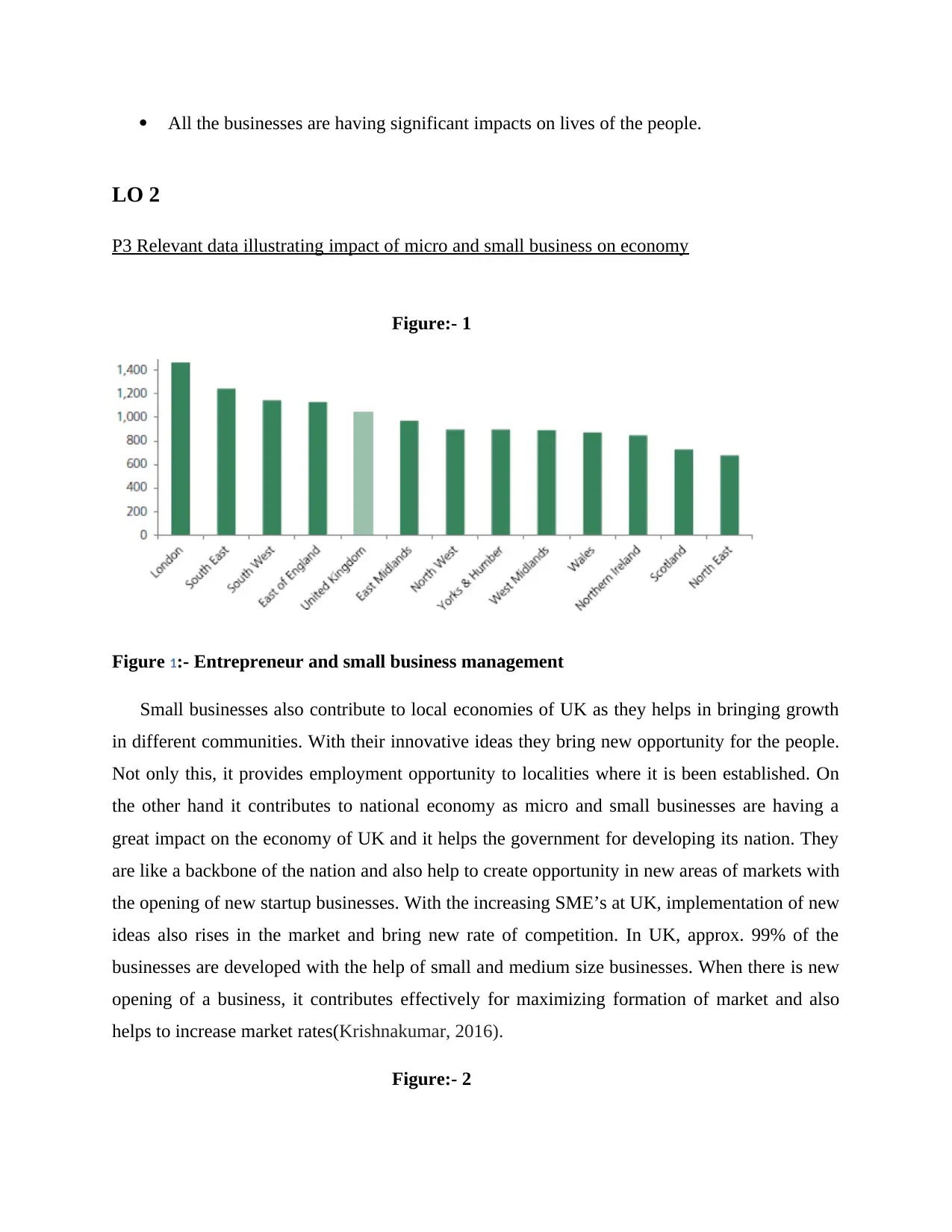
All the businesses are having significant impacts on lives of the people.
LO 2
P3 Relevant data illustrating impact of micro and small business on economy
Figure:- 1
Figure 1:- Entrepreneur and small business management
Small businesses also contribute to local economies of UK as they helps in bringing growth
in different communities. With their innovative ideas they bring new opportunity for the people.
Not only this, it provides employment opportunity to localities where it is been established. On
the other hand it contributes to national economy as micro and small businesses are having a
great impact on the economy of UK and it helps the government for developing its nation. They
are like a backbone of the nation and also help to create opportunity in new areas of markets with
the opening of new startup businesses. With the increasing SME’s at UK, implementation of new
ideas also rises in the market and bring new rate of competition. In UK, approx. 99% of the
businesses are developed with the help of small and medium size businesses. When there is new
opening of a business, it contributes effectively for maximizing formation of market and also
helps to increase market rates(Krishnakumar, 2016).
Figure:- 2
LO 2
P3 Relevant data illustrating impact of micro and small business on economy
Figure:- 1
Figure 1:- Entrepreneur and small business management
Small businesses also contribute to local economies of UK as they helps in bringing growth
in different communities. With their innovative ideas they bring new opportunity for the people.
Not only this, it provides employment opportunity to localities where it is been established. On
the other hand it contributes to national economy as micro and small businesses are having a
great impact on the economy of UK and it helps the government for developing its nation. They
are like a backbone of the nation and also help to create opportunity in new areas of markets with
the opening of new startup businesses. With the increasing SME’s at UK, implementation of new
ideas also rises in the market and bring new rate of competition. In UK, approx. 99% of the
businesses are developed with the help of small and medium size businesses. When there is new
opening of a business, it contributes effectively for maximizing formation of market and also
helps to increase market rates(Krishnakumar, 2016).
Figure:- 2
Paraphrase This Document
Need a fresh take? Get an instant paraphrase of this document with our AI Paraphraser
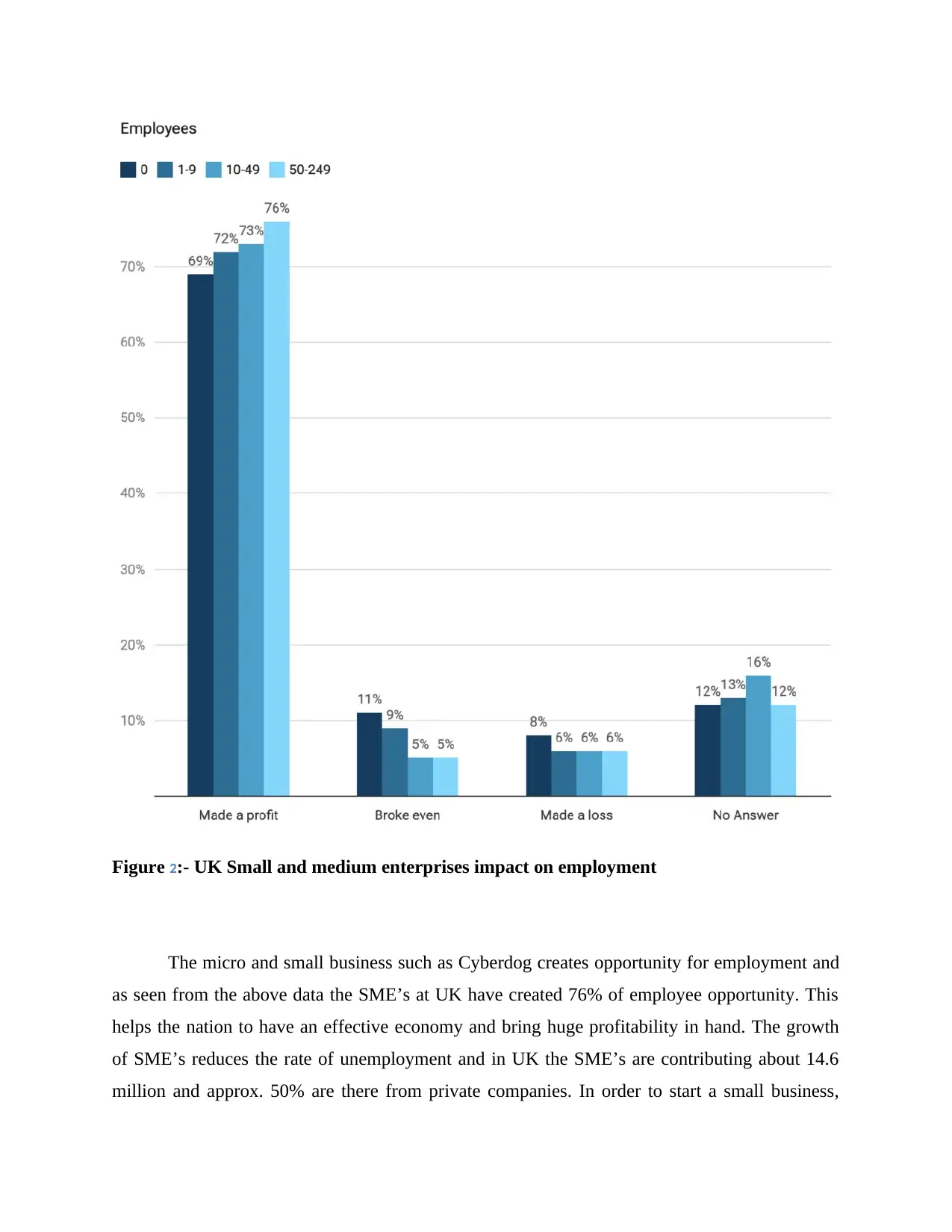
Figure 2:- UK Small and medium enterprises impact on employment
The micro and small business such as Cyberdog creates opportunity for employment and
as seen from the above data the SME’s at UK have created 76% of employee opportunity. This
helps the nation to have an effective economy and bring huge profitability in hand. The growth
of SME’s reduces the rate of unemployment and in UK the SME’s are contributing about 14.6
million and approx. 50% are there from private companies. In order to start a small business,
The micro and small business such as Cyberdog creates opportunity for employment and
as seen from the above data the SME’s at UK have created 76% of employee opportunity. This
helps the nation to have an effective economy and bring huge profitability in hand. The growth
of SME’s reduces the rate of unemployment and in UK the SME’s are contributing about 14.6
million and approx. 50% are there from private companies. In order to start a small business,

employees contribute very effectively with the help of their key skills. On the other side, all the
small and medium sized enterprises like Cyberdog are less complex as compared with that of
large businesses. That is the reason it becomes easier to handle and increases the rate of
production that directly brings huge profitability of the business. With the help of SME’s
different products are been exported in other countries and that directly leads to improvement in
economy of the nation. There are about 1.2 million people that are working for development of
new businesses and that is increasing the new opportunity for the unemployed once(Aguilera,
Kim and Lee, 2018).
The SMEs in UK has provided an hand in increasing the productivity of the country. It
has been seen that if there are 100 SMEs in UK then out of them 18 will be in professional and
technical sector. The expansion in the SMEs sector has lead to the growth in the business sizes
across various sectors in health and education. This has lead to the increase in the overall
productivity of the business organization. The below graph provides a detailed information.
small and medium sized enterprises like Cyberdog are less complex as compared with that of
large businesses. That is the reason it becomes easier to handle and increases the rate of
production that directly brings huge profitability of the business. With the help of SME’s
different products are been exported in other countries and that directly leads to improvement in
economy of the nation. There are about 1.2 million people that are working for development of
new businesses and that is increasing the new opportunity for the unemployed once(Aguilera,
Kim and Lee, 2018).
The SMEs in UK has provided an hand in increasing the productivity of the country. It
has been seen that if there are 100 SMEs in UK then out of them 18 will be in professional and
technical sector. The expansion in the SMEs sector has lead to the growth in the business sizes
across various sectors in health and education. This has lead to the increase in the overall
productivity of the business organization. The below graph provides a detailed information.
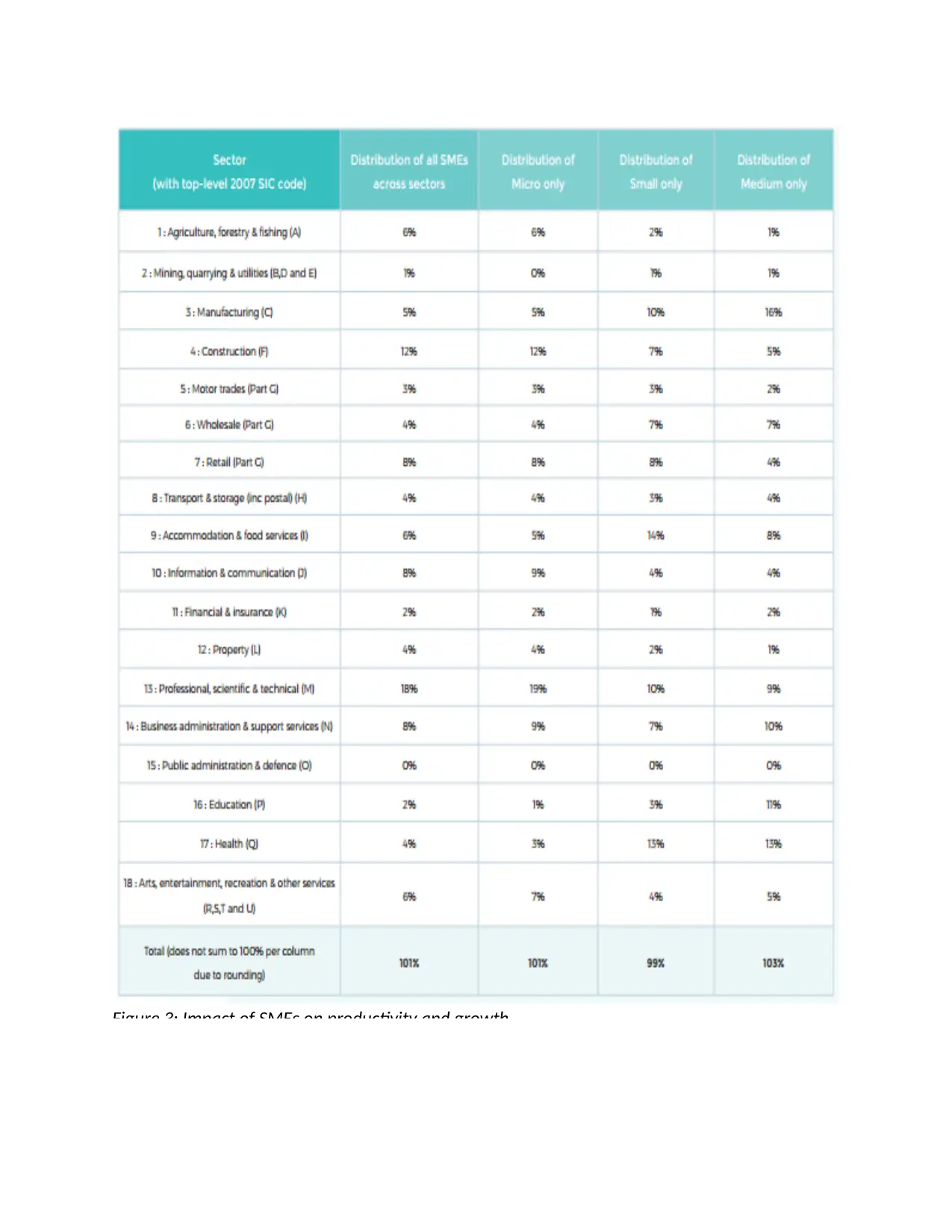
Figure 3: Impact of SMEs on productivity and growth
Secure Best Marks with AI Grader
Need help grading? Try our AI Grader for instant feedback on your assignments.
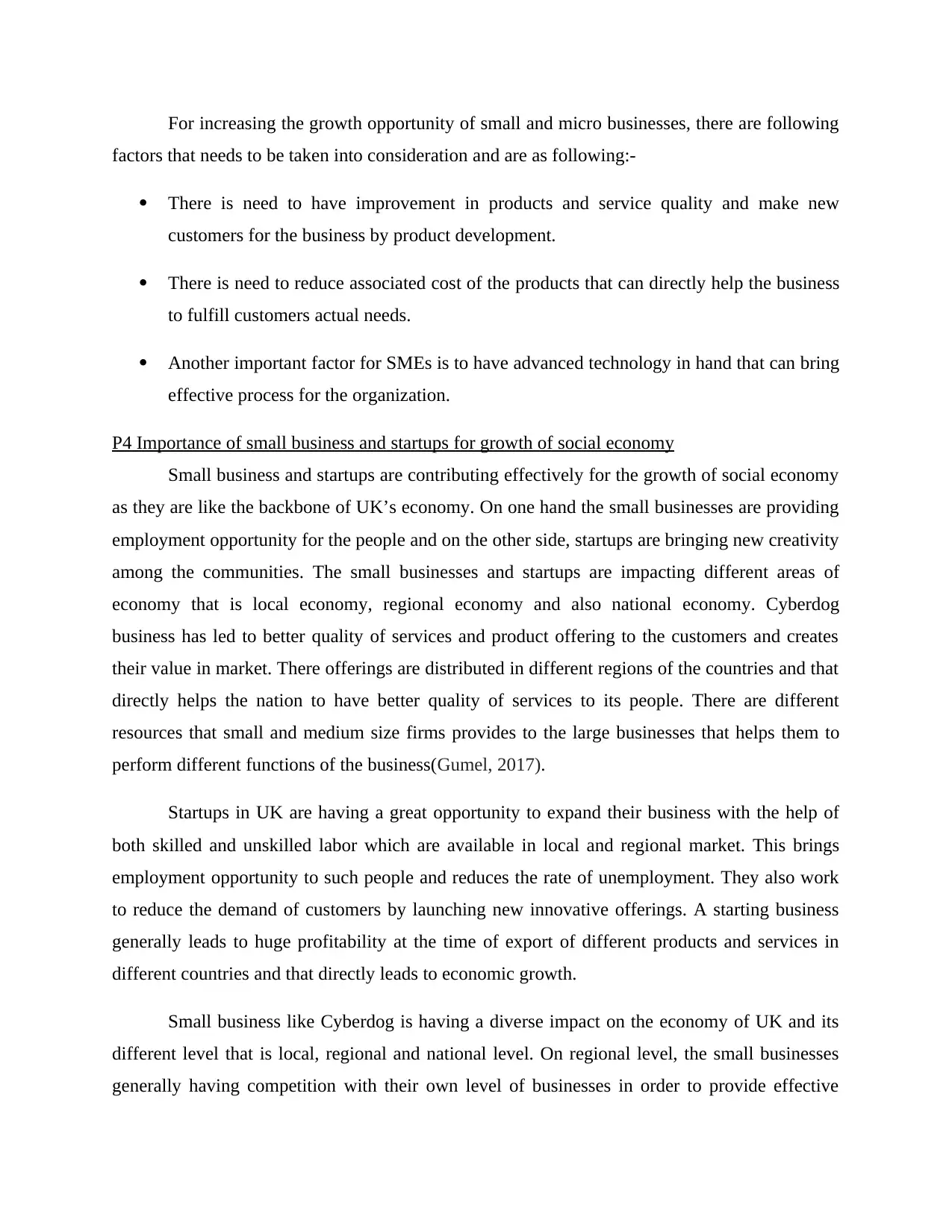
For increasing the growth opportunity of small and micro businesses, there are following
factors that needs to be taken into consideration and are as following:-
There is need to have improvement in products and service quality and make new
customers for the business by product development.
There is need to reduce associated cost of the products that can directly help the business
to fulfill customers actual needs.
Another important factor for SMEs is to have advanced technology in hand that can bring
effective process for the organization.
P4 Importance of small business and startups for growth of social economy
Small business and startups are contributing effectively for the growth of social economy
as they are like the backbone of UK’s economy. On one hand the small businesses are providing
employment opportunity for the people and on the other side, startups are bringing new creativity
among the communities. The small businesses and startups are impacting different areas of
economy that is local economy, regional economy and also national economy. Cyberdog
business has led to better quality of services and product offering to the customers and creates
their value in market. There offerings are distributed in different regions of the countries and that
directly helps the nation to have better quality of services to its people. There are different
resources that small and medium size firms provides to the large businesses that helps them to
perform different functions of the business(Gumel, 2017).
Startups in UK are having a great opportunity to expand their business with the help of
both skilled and unskilled labor which are available in local and regional market. This brings
employment opportunity to such people and reduces the rate of unemployment. They also work
to reduce the demand of customers by launching new innovative offerings. A starting business
generally leads to huge profitability at the time of export of different products and services in
different countries and that directly leads to economic growth.
Small business like Cyberdog is having a diverse impact on the economy of UK and its
different level that is local, regional and national level. On regional level, the small businesses
generally having competition with their own level of businesses in order to provide effective
factors that needs to be taken into consideration and are as following:-
There is need to have improvement in products and service quality and make new
customers for the business by product development.
There is need to reduce associated cost of the products that can directly help the business
to fulfill customers actual needs.
Another important factor for SMEs is to have advanced technology in hand that can bring
effective process for the organization.
P4 Importance of small business and startups for growth of social economy
Small business and startups are contributing effectively for the growth of social economy
as they are like the backbone of UK’s economy. On one hand the small businesses are providing
employment opportunity for the people and on the other side, startups are bringing new creativity
among the communities. The small businesses and startups are impacting different areas of
economy that is local economy, regional economy and also national economy. Cyberdog
business has led to better quality of services and product offering to the customers and creates
their value in market. There offerings are distributed in different regions of the countries and that
directly helps the nation to have better quality of services to its people. There are different
resources that small and medium size firms provides to the large businesses that helps them to
perform different functions of the business(Gumel, 2017).
Startups in UK are having a great opportunity to expand their business with the help of
both skilled and unskilled labor which are available in local and regional market. This brings
employment opportunity to such people and reduces the rate of unemployment. They also work
to reduce the demand of customers by launching new innovative offerings. A starting business
generally leads to huge profitability at the time of export of different products and services in
different countries and that directly leads to economic growth.
Small business like Cyberdog is having a diverse impact on the economy of UK and its
different level that is local, regional and national level. On regional level, the small businesses
generally having competition with their own level of businesses in order to provide effective
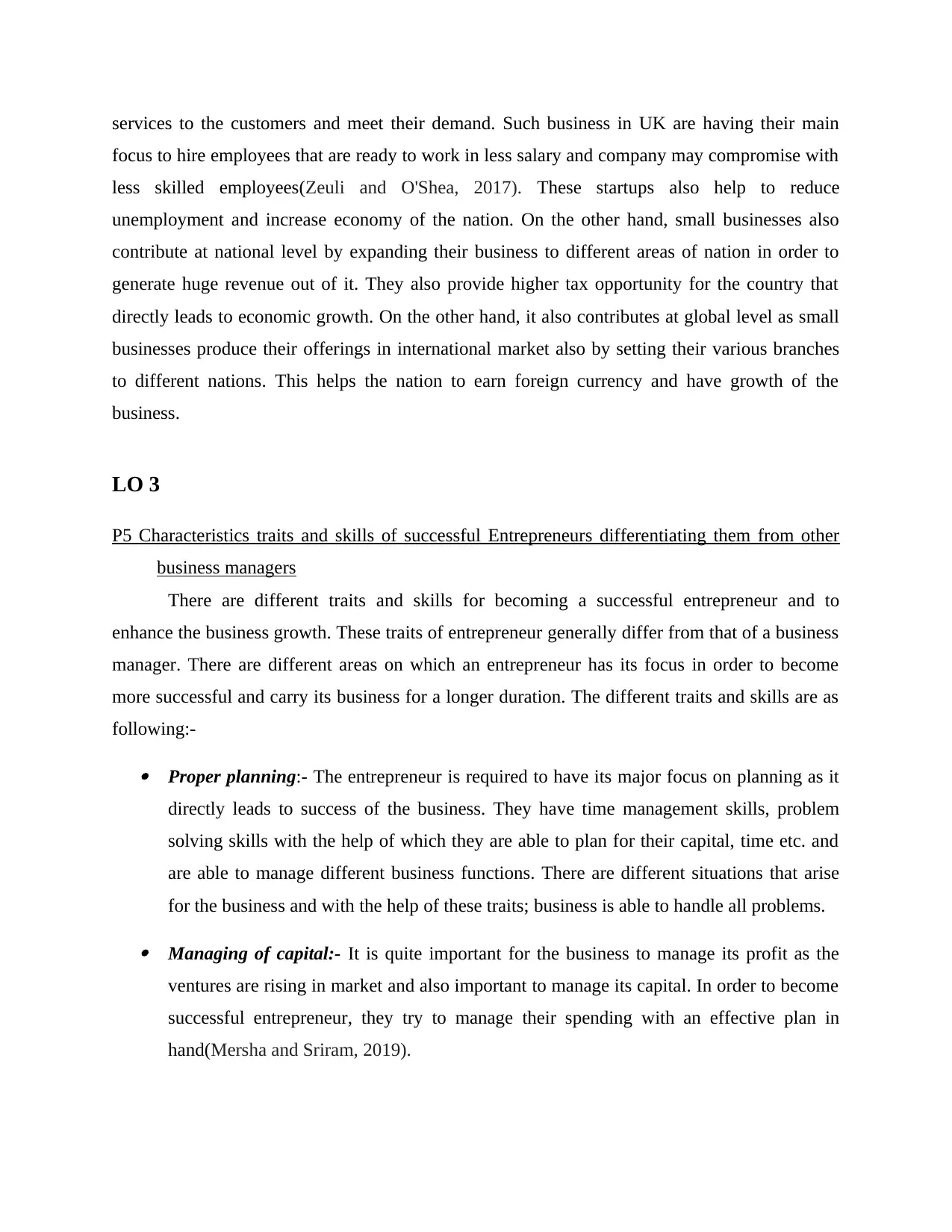
services to the customers and meet their demand. Such business in UK are having their main
focus to hire employees that are ready to work in less salary and company may compromise with
less skilled employees(Zeuli and O'Shea, 2017). These startups also help to reduce
unemployment and increase economy of the nation. On the other hand, small businesses also
contribute at national level by expanding their business to different areas of nation in order to
generate huge revenue out of it. They also provide higher tax opportunity for the country that
directly leads to economic growth. On the other hand, it also contributes at global level as small
businesses produce their offerings in international market also by setting their various branches
to different nations. This helps the nation to earn foreign currency and have growth of the
business.
LO 3
P5 Characteristics traits and skills of successful Entrepreneurs differentiating them from other
business managers
There are different traits and skills for becoming a successful entrepreneur and to
enhance the business growth. These traits of entrepreneur generally differ from that of a business
manager. There are different areas on which an entrepreneur has its focus in order to become
more successful and carry its business for a longer duration. The different traits and skills are as
following:-
Proper planning:- The entrepreneur is required to have its major focus on planning as it
directly leads to success of the business. They have time management skills, problem
solving skills with the help of which they are able to plan for their capital, time etc. and
are able to manage different business functions. There are different situations that arise
for the business and with the help of these traits; business is able to handle all problems.
Managing of capital:- It is quite important for the business to manage its profit as the
ventures are rising in market and also important to manage its capital. In order to become
successful entrepreneur, they try to manage their spending with an effective plan in
hand(Mersha and Sriram, 2019).
focus to hire employees that are ready to work in less salary and company may compromise with
less skilled employees(Zeuli and O'Shea, 2017). These startups also help to reduce
unemployment and increase economy of the nation. On the other hand, small businesses also
contribute at national level by expanding their business to different areas of nation in order to
generate huge revenue out of it. They also provide higher tax opportunity for the country that
directly leads to economic growth. On the other hand, it also contributes at global level as small
businesses produce their offerings in international market also by setting their various branches
to different nations. This helps the nation to earn foreign currency and have growth of the
business.
LO 3
P5 Characteristics traits and skills of successful Entrepreneurs differentiating them from other
business managers
There are different traits and skills for becoming a successful entrepreneur and to
enhance the business growth. These traits of entrepreneur generally differ from that of a business
manager. There are different areas on which an entrepreneur has its focus in order to become
more successful and carry its business for a longer duration. The different traits and skills are as
following:-
Proper planning:- The entrepreneur is required to have its major focus on planning as it
directly leads to success of the business. They have time management skills, problem
solving skills with the help of which they are able to plan for their capital, time etc. and
are able to manage different business functions. There are different situations that arise
for the business and with the help of these traits; business is able to handle all problems.
Managing of capital:- It is quite important for the business to manage its profit as the
ventures are rising in market and also important to manage its capital. In order to become
successful entrepreneur, they try to manage their spending with an effective plan in
hand(Mersha and Sriram, 2019).
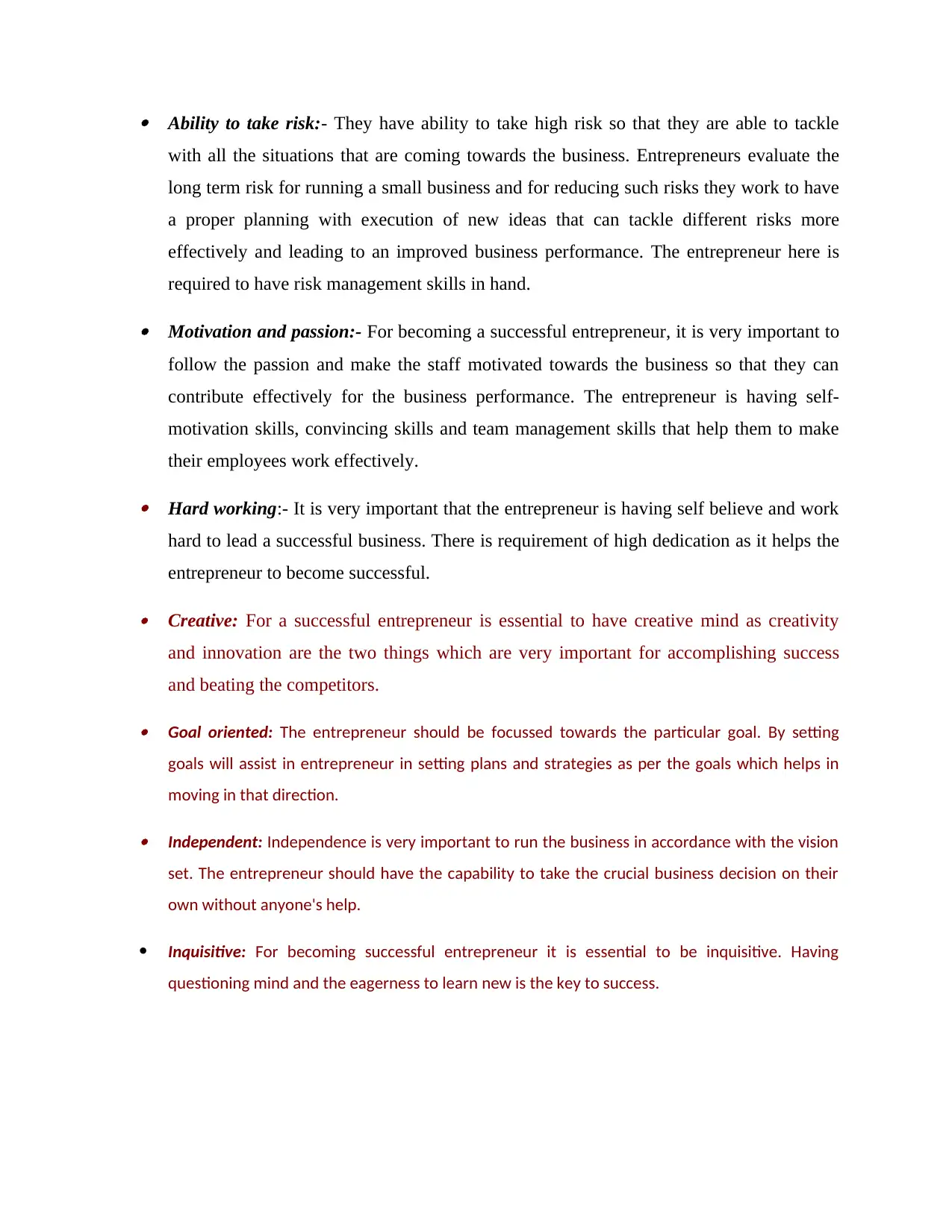
Ability to take risk:- They have ability to take high risk so that they are able to tackle
with all the situations that are coming towards the business. Entrepreneurs evaluate the
long term risk for running a small business and for reducing such risks they work to have
a proper planning with execution of new ideas that can tackle different risks more
effectively and leading to an improved business performance. The entrepreneur here is
required to have risk management skills in hand.
Motivation and passion:- For becoming a successful entrepreneur, it is very important to
follow the passion and make the staff motivated towards the business so that they can
contribute effectively for the business performance. The entrepreneur is having self-
motivation skills, convincing skills and team management skills that help them to make
their employees work effectively.
Hard working:- It is very important that the entrepreneur is having self believe and work
hard to lead a successful business. There is requirement of high dedication as it helps the
entrepreneur to become successful.
Creative: For a successful entrepreneur is essential to have creative mind as creativity
and innovation are the two things which are very important for accomplishing success
and beating the competitors.
Goal oriented: The entrepreneur should be focussed towards the particular goal. By setting
goals will assist in entrepreneur in setting plans and strategies as per the goals which helps in
moving in that direction.
Independent: Independence is very important to run the business in accordance with the vision
set. The entrepreneur should have the capability to take the crucial business decision on their
own without anyone's help.
Inquisitive: For becoming successful entrepreneur it is essential to be inquisitive. Having
questioning mind and the eagerness to learn new is the key to success.
with all the situations that are coming towards the business. Entrepreneurs evaluate the
long term risk for running a small business and for reducing such risks they work to have
a proper planning with execution of new ideas that can tackle different risks more
effectively and leading to an improved business performance. The entrepreneur here is
required to have risk management skills in hand.
Motivation and passion:- For becoming a successful entrepreneur, it is very important to
follow the passion and make the staff motivated towards the business so that they can
contribute effectively for the business performance. The entrepreneur is having self-
motivation skills, convincing skills and team management skills that help them to make
their employees work effectively.
Hard working:- It is very important that the entrepreneur is having self believe and work
hard to lead a successful business. There is requirement of high dedication as it helps the
entrepreneur to become successful.
Creative: For a successful entrepreneur is essential to have creative mind as creativity
and innovation are the two things which are very important for accomplishing success
and beating the competitors.
Goal oriented: The entrepreneur should be focussed towards the particular goal. By setting
goals will assist in entrepreneur in setting plans and strategies as per the goals which helps in
moving in that direction.
Independent: Independence is very important to run the business in accordance with the vision
set. The entrepreneur should have the capability to take the crucial business decision on their
own without anyone's help.
Inquisitive: For becoming successful entrepreneur it is essential to be inquisitive. Having
questioning mind and the eagerness to learn new is the key to success.
Paraphrase This Document
Need a fresh take? Get an instant paraphrase of this document with our AI Paraphraser
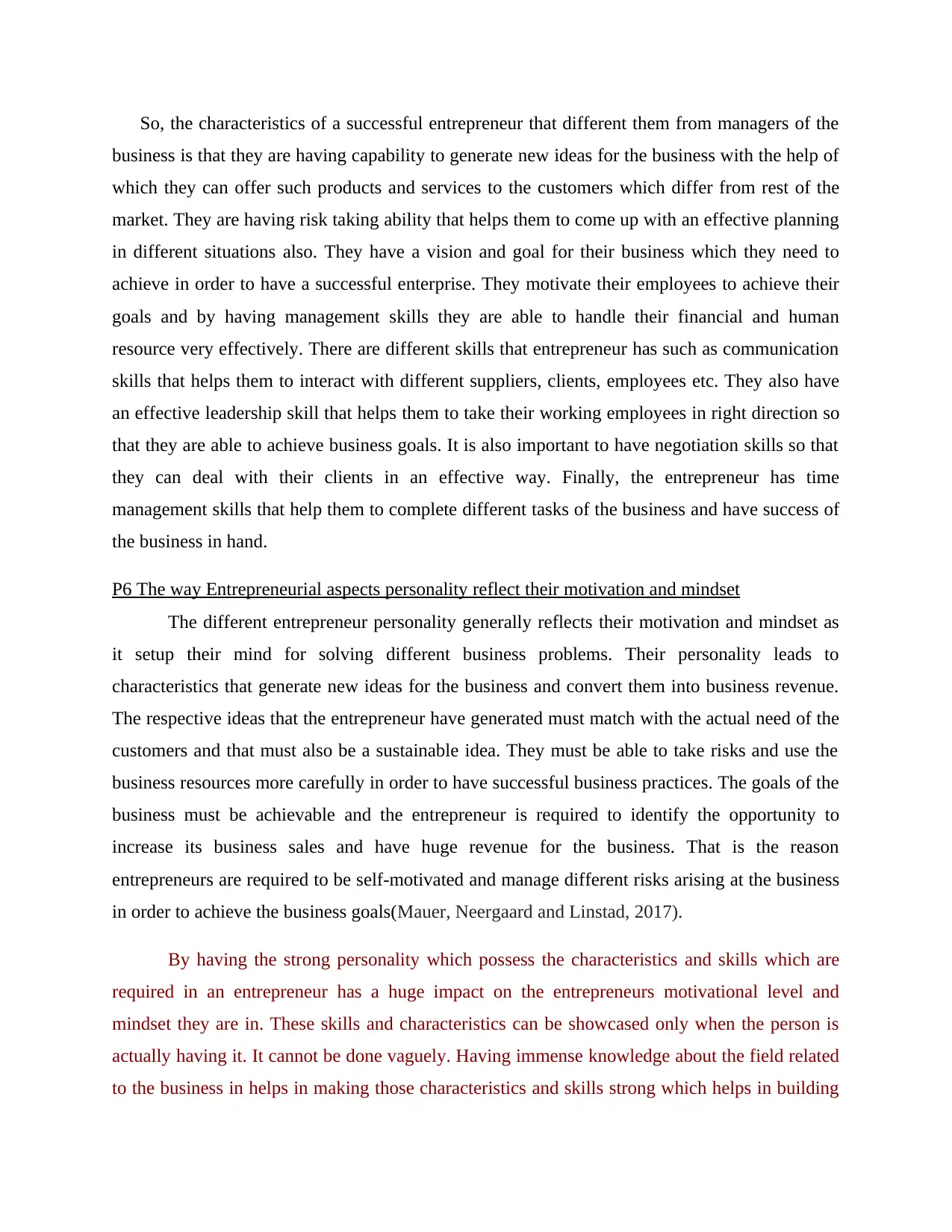
So, the characteristics of a successful entrepreneur that different them from managers of the
business is that they are having capability to generate new ideas for the business with the help of
which they can offer such products and services to the customers which differ from rest of the
market. They are having risk taking ability that helps them to come up with an effective planning
in different situations also. They have a vision and goal for their business which they need to
achieve in order to have a successful enterprise. They motivate their employees to achieve their
goals and by having management skills they are able to handle their financial and human
resource very effectively. There are different skills that entrepreneur has such as communication
skills that helps them to interact with different suppliers, clients, employees etc. They also have
an effective leadership skill that helps them to take their working employees in right direction so
that they are able to achieve business goals. It is also important to have negotiation skills so that
they can deal with their clients in an effective way. Finally, the entrepreneur has time
management skills that help them to complete different tasks of the business and have success of
the business in hand.
P6 The way Entrepreneurial aspects personality reflect their motivation and mindset
The different entrepreneur personality generally reflects their motivation and mindset as
it setup their mind for solving different business problems. Their personality leads to
characteristics that generate new ideas for the business and convert them into business revenue.
The respective ideas that the entrepreneur have generated must match with the actual need of the
customers and that must also be a sustainable idea. They must be able to take risks and use the
business resources more carefully in order to have successful business practices. The goals of the
business must be achievable and the entrepreneur is required to identify the opportunity to
increase its business sales and have huge revenue for the business. That is the reason
entrepreneurs are required to be self-motivated and manage different risks arising at the business
in order to achieve the business goals(Mauer, Neergaard and Linstad, 2017).
By having the strong personality which possess the characteristics and skills which are
required in an entrepreneur has a huge impact on the entrepreneurs motivational level and
mindset they are in. These skills and characteristics can be showcased only when the person is
actually having it. It cannot be done vaguely. Having immense knowledge about the field related
to the business in helps in making those characteristics and skills strong which helps in building
business is that they are having capability to generate new ideas for the business with the help of
which they can offer such products and services to the customers which differ from rest of the
market. They are having risk taking ability that helps them to come up with an effective planning
in different situations also. They have a vision and goal for their business which they need to
achieve in order to have a successful enterprise. They motivate their employees to achieve their
goals and by having management skills they are able to handle their financial and human
resource very effectively. There are different skills that entrepreneur has such as communication
skills that helps them to interact with different suppliers, clients, employees etc. They also have
an effective leadership skill that helps them to take their working employees in right direction so
that they are able to achieve business goals. It is also important to have negotiation skills so that
they can deal with their clients in an effective way. Finally, the entrepreneur has time
management skills that help them to complete different tasks of the business and have success of
the business in hand.
P6 The way Entrepreneurial aspects personality reflect their motivation and mindset
The different entrepreneur personality generally reflects their motivation and mindset as
it setup their mind for solving different business problems. Their personality leads to
characteristics that generate new ideas for the business and convert them into business revenue.
The respective ideas that the entrepreneur have generated must match with the actual need of the
customers and that must also be a sustainable idea. They must be able to take risks and use the
business resources more carefully in order to have successful business practices. The goals of the
business must be achievable and the entrepreneur is required to identify the opportunity to
increase its business sales and have huge revenue for the business. That is the reason
entrepreneurs are required to be self-motivated and manage different risks arising at the business
in order to achieve the business goals(Mauer, Neergaard and Linstad, 2017).
By having the strong personality which possess the characteristics and skills which are
required in an entrepreneur has a huge impact on the entrepreneurs motivational level and
mindset they are in. These skills and characteristics can be showcased only when the person is
actually having it. It cannot be done vaguely. Having immense knowledge about the field related
to the business in helps in making those characteristics and skills strong which helps in building
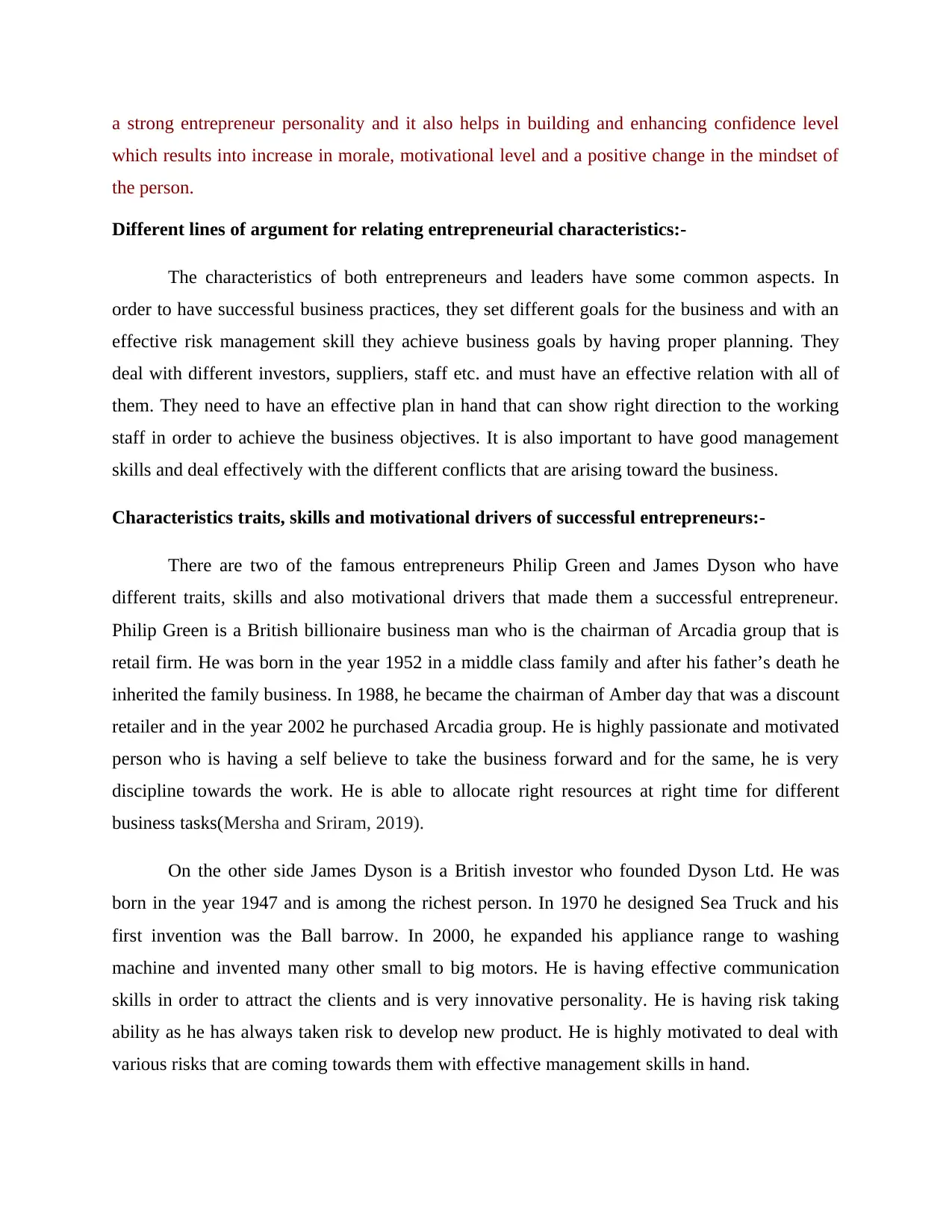
a strong entrepreneur personality and it also helps in building and enhancing confidence level
which results into increase in morale, motivational level and a positive change in the mindset of
the person.
Different lines of argument for relating entrepreneurial characteristics:-
The characteristics of both entrepreneurs and leaders have some common aspects. In
order to have successful business practices, they set different goals for the business and with an
effective risk management skill they achieve business goals by having proper planning. They
deal with different investors, suppliers, staff etc. and must have an effective relation with all of
them. They need to have an effective plan in hand that can show right direction to the working
staff in order to achieve the business objectives. It is also important to have good management
skills and deal effectively with the different conflicts that are arising toward the business.
Characteristics traits, skills and motivational drivers of successful entrepreneurs:-
There are two of the famous entrepreneurs Philip Green and James Dyson who have
different traits, skills and also motivational drivers that made them a successful entrepreneur.
Philip Green is a British billionaire business man who is the chairman of Arcadia group that is
retail firm. He was born in the year 1952 in a middle class family and after his father’s death he
inherited the family business. In 1988, he became the chairman of Amber day that was a discount
retailer and in the year 2002 he purchased Arcadia group. He is highly passionate and motivated
person who is having a self believe to take the business forward and for the same, he is very
discipline towards the work. He is able to allocate right resources at right time for different
business tasks(Mersha and Sriram, 2019).
On the other side James Dyson is a British investor who founded Dyson Ltd. He was
born in the year 1947 and is among the richest person. In 1970 he designed Sea Truck and his
first invention was the Ball barrow. In 2000, he expanded his appliance range to washing
machine and invented many other small to big motors. He is having effective communication
skills in order to attract the clients and is very innovative personality. He is having risk taking
ability as he has always taken risk to develop new product. He is highly motivated to deal with
various risks that are coming towards them with effective management skills in hand.
which results into increase in morale, motivational level and a positive change in the mindset of
the person.
Different lines of argument for relating entrepreneurial characteristics:-
The characteristics of both entrepreneurs and leaders have some common aspects. In
order to have successful business practices, they set different goals for the business and with an
effective risk management skill they achieve business goals by having proper planning. They
deal with different investors, suppliers, staff etc. and must have an effective relation with all of
them. They need to have an effective plan in hand that can show right direction to the working
staff in order to achieve the business objectives. It is also important to have good management
skills and deal effectively with the different conflicts that are arising toward the business.
Characteristics traits, skills and motivational drivers of successful entrepreneurs:-
There are two of the famous entrepreneurs Philip Green and James Dyson who have
different traits, skills and also motivational drivers that made them a successful entrepreneur.
Philip Green is a British billionaire business man who is the chairman of Arcadia group that is
retail firm. He was born in the year 1952 in a middle class family and after his father’s death he
inherited the family business. In 1988, he became the chairman of Amber day that was a discount
retailer and in the year 2002 he purchased Arcadia group. He is highly passionate and motivated
person who is having a self believe to take the business forward and for the same, he is very
discipline towards the work. He is able to allocate right resources at right time for different
business tasks(Mersha and Sriram, 2019).
On the other side James Dyson is a British investor who founded Dyson Ltd. He was
born in the year 1947 and is among the richest person. In 1970 he designed Sea Truck and his
first invention was the Ball barrow. In 2000, he expanded his appliance range to washing
machine and invented many other small to big motors. He is having effective communication
skills in order to attract the clients and is very innovative personality. He is having risk taking
ability as he has always taken risk to develop new product. He is highly motivated to deal with
various risks that are coming towards them with effective management skills in hand.
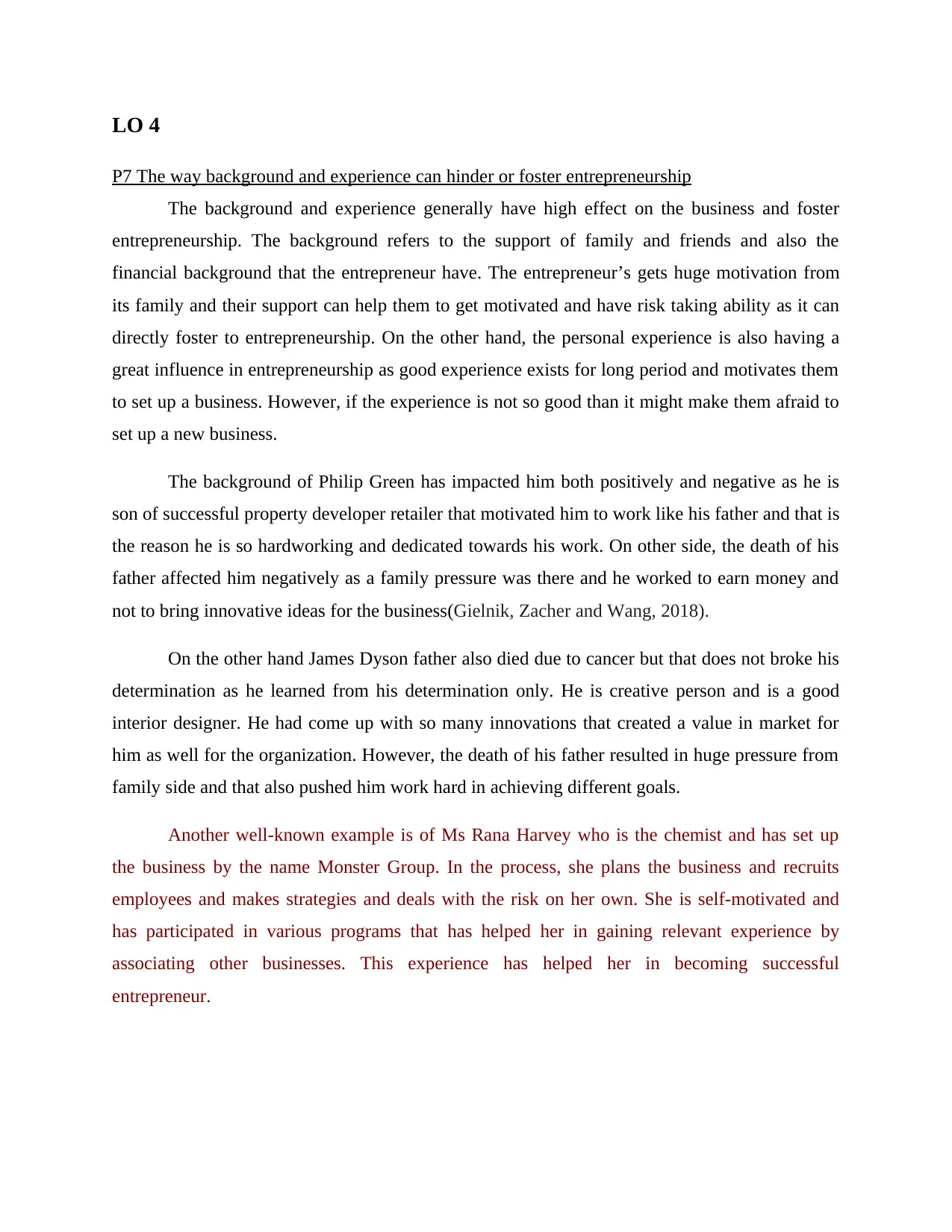
LO 4
P7 The way background and experience can hinder or foster entrepreneurship
The background and experience generally have high effect on the business and foster
entrepreneurship. The background refers to the support of family and friends and also the
financial background that the entrepreneur have. The entrepreneur’s gets huge motivation from
its family and their support can help them to get motivated and have risk taking ability as it can
directly foster to entrepreneurship. On the other hand, the personal experience is also having a
great influence in entrepreneurship as good experience exists for long period and motivates them
to set up a business. However, if the experience is not so good than it might make them afraid to
set up a new business.
The background of Philip Green has impacted him both positively and negative as he is
son of successful property developer retailer that motivated him to work like his father and that is
the reason he is so hardworking and dedicated towards his work. On other side, the death of his
father affected him negatively as a family pressure was there and he worked to earn money and
not to bring innovative ideas for the business(Gielnik, Zacher and Wang, 2018).
On the other hand James Dyson father also died due to cancer but that does not broke his
determination as he learned from his determination only. He is creative person and is a good
interior designer. He had come up with so many innovations that created a value in market for
him as well for the organization. However, the death of his father resulted in huge pressure from
family side and that also pushed him work hard in achieving different goals.
Another well-known example is of Ms Rana Harvey who is the chemist and has set up
the business by the name Monster Group. In the process, she plans the business and recruits
employees and makes strategies and deals with the risk on her own. She is self-motivated and
has participated in various programs that has helped her in gaining relevant experience by
associating other businesses. This experience has helped her in becoming successful
entrepreneur.
P7 The way background and experience can hinder or foster entrepreneurship
The background and experience generally have high effect on the business and foster
entrepreneurship. The background refers to the support of family and friends and also the
financial background that the entrepreneur have. The entrepreneur’s gets huge motivation from
its family and their support can help them to get motivated and have risk taking ability as it can
directly foster to entrepreneurship. On the other hand, the personal experience is also having a
great influence in entrepreneurship as good experience exists for long period and motivates them
to set up a business. However, if the experience is not so good than it might make them afraid to
set up a new business.
The background of Philip Green has impacted him both positively and negative as he is
son of successful property developer retailer that motivated him to work like his father and that is
the reason he is so hardworking and dedicated towards his work. On other side, the death of his
father affected him negatively as a family pressure was there and he worked to earn money and
not to bring innovative ideas for the business(Gielnik, Zacher and Wang, 2018).
On the other hand James Dyson father also died due to cancer but that does not broke his
determination as he learned from his determination only. He is creative person and is a good
interior designer. He had come up with so many innovations that created a value in market for
him as well for the organization. However, the death of his father resulted in huge pressure from
family side and that also pushed him work hard in achieving different goals.
Another well-known example is of Ms Rana Harvey who is the chemist and has set up
the business by the name Monster Group. In the process, she plans the business and recruits
employees and makes strategies and deals with the risk on her own. She is self-motivated and
has participated in various programs that has helped her in gaining relevant experience by
associating other businesses. This experience has helped her in becoming successful
entrepreneur.
Secure Best Marks with AI Grader
Need help grading? Try our AI Grader for instant feedback on your assignments.
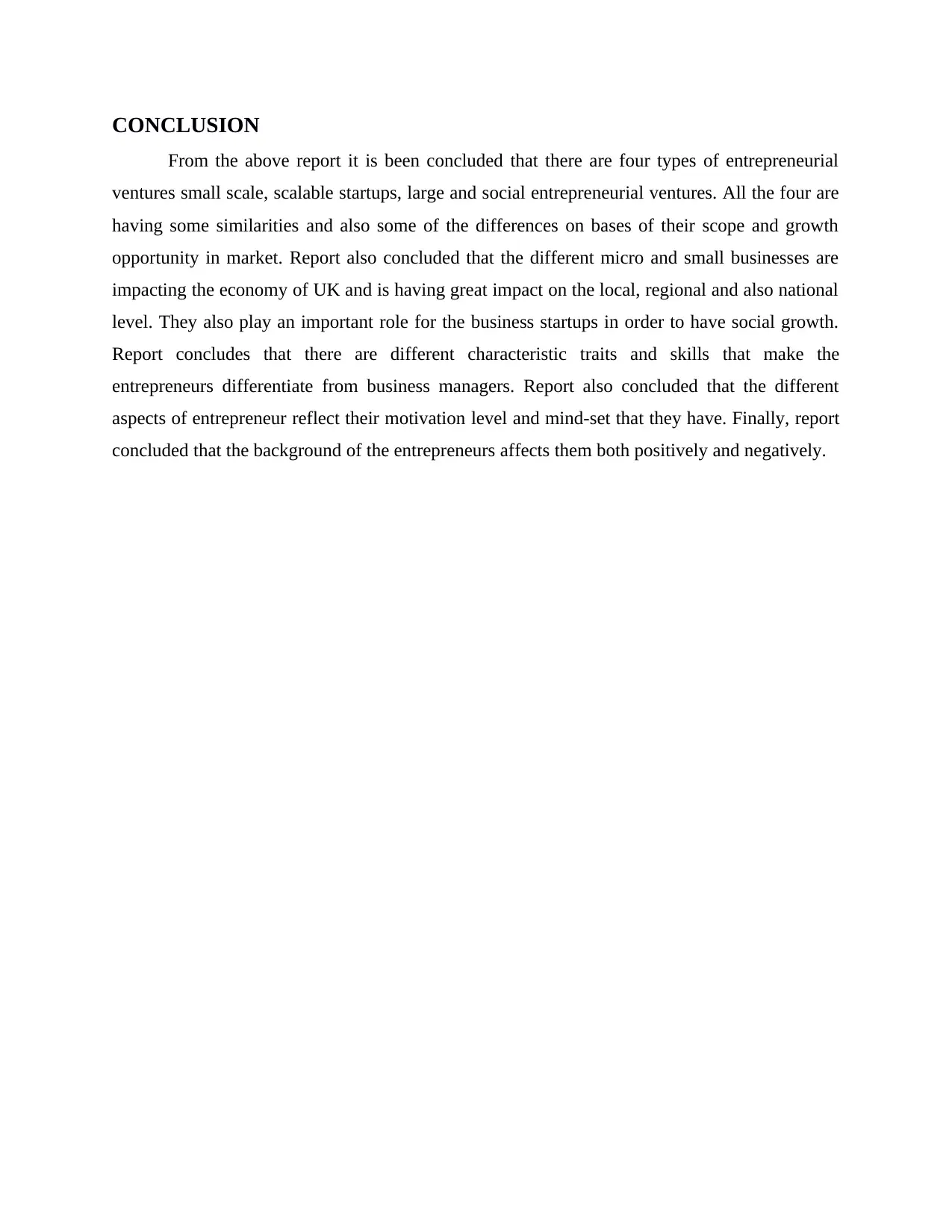
CONCLUSION
From the above report it is been concluded that there are four types of entrepreneurial
ventures small scale, scalable startups, large and social entrepreneurial ventures. All the four are
having some similarities and also some of the differences on bases of their scope and growth
opportunity in market. Report also concluded that the different micro and small businesses are
impacting the economy of UK and is having great impact on the local, regional and also national
level. They also play an important role for the business startups in order to have social growth.
Report concludes that there are different characteristic traits and skills that make the
entrepreneurs differentiate from business managers. Report also concluded that the different
aspects of entrepreneur reflect their motivation level and mind-set that they have. Finally, report
concluded that the background of the entrepreneurs affects them both positively and negatively.
From the above report it is been concluded that there are four types of entrepreneurial
ventures small scale, scalable startups, large and social entrepreneurial ventures. All the four are
having some similarities and also some of the differences on bases of their scope and growth
opportunity in market. Report also concluded that the different micro and small businesses are
impacting the economy of UK and is having great impact on the local, regional and also national
level. They also play an important role for the business startups in order to have social growth.
Report concludes that there are different characteristic traits and skills that make the
entrepreneurs differentiate from business managers. Report also concluded that the different
aspects of entrepreneur reflect their motivation level and mind-set that they have. Finally, report
concluded that the background of the entrepreneurs affects them both positively and negatively.
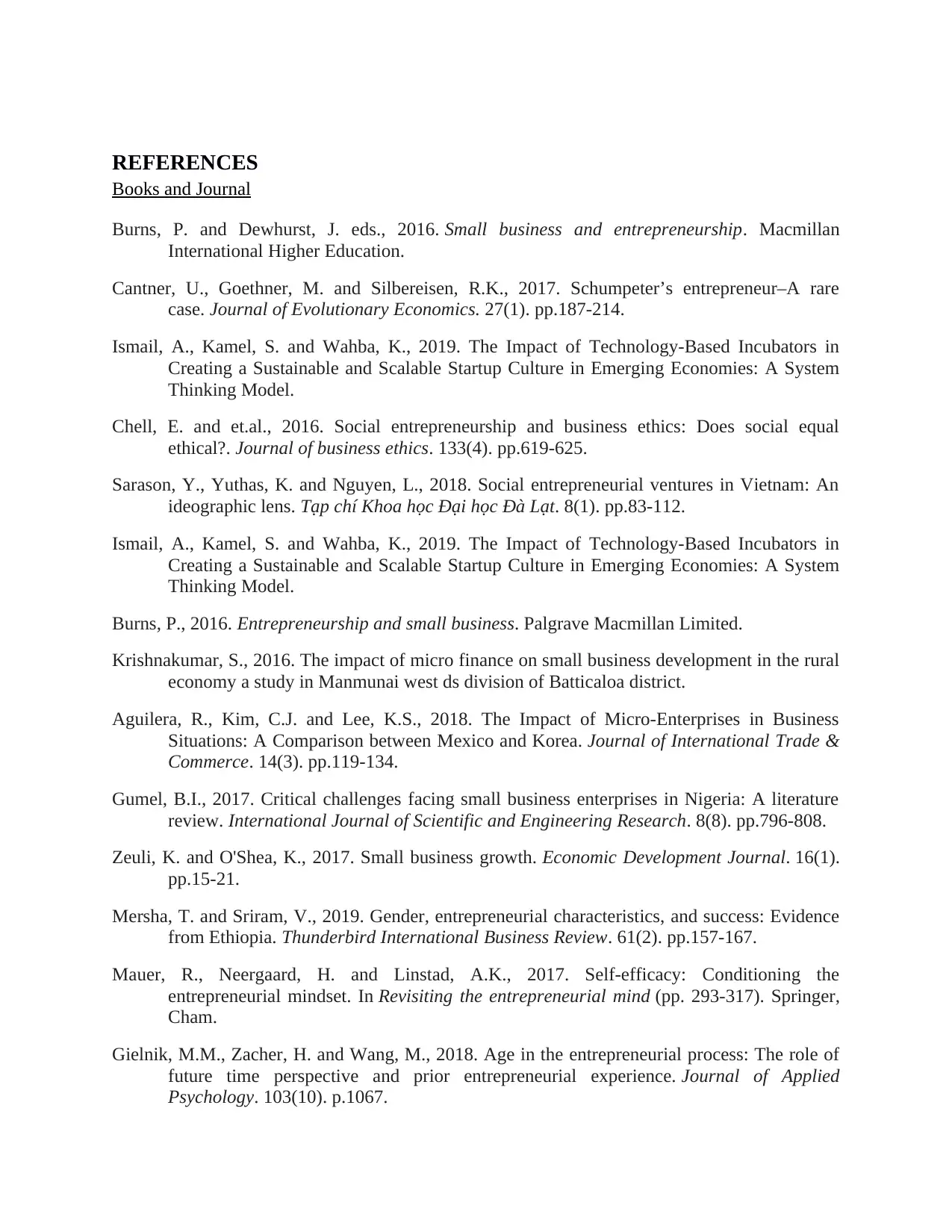
REFERENCES
Books and Journal
Burns, P. and Dewhurst, J. eds., 2016. Small business and entrepreneurship. Macmillan
International Higher Education.
Cantner, U., Goethner, M. and Silbereisen, R.K., 2017. Schumpeter’s entrepreneur–A rare
case. Journal of Evolutionary Economics. 27(1). pp.187-214.
Ismail, A., Kamel, S. and Wahba, K., 2019. The Impact of Technology-Based Incubators in
Creating a Sustainable and Scalable Startup Culture in Emerging Economies: A System
Thinking Model.
Chell, E. and et.al., 2016. Social entrepreneurship and business ethics: Does social equal
ethical?. Journal of business ethics. 133(4). pp.619-625.
Sarason, Y., Yuthas, K. and Nguyen, L., 2018. Social entrepreneurial ventures in Vietnam: An
ideographic lens. Tạp chí Khoa học Đại học Đà Lạt. 8(1). pp.83-112.
Ismail, A., Kamel, S. and Wahba, K., 2019. The Impact of Technology-Based Incubators in
Creating a Sustainable and Scalable Startup Culture in Emerging Economies: A System
Thinking Model.
Burns, P., 2016. Entrepreneurship and small business. Palgrave Macmillan Limited.
Krishnakumar, S., 2016. The impact of micro finance on small business development in the rural
economy a study in Manmunai west ds division of Batticaloa district.
Aguilera, R., Kim, C.J. and Lee, K.S., 2018. The Impact of Micro-Enterprises in Business
Situations: A Comparison between Mexico and Korea. Journal of International Trade &
Commerce. 14(3). pp.119-134.
Gumel, B.I., 2017. Critical challenges facing small business enterprises in Nigeria: A literature
review. International Journal of Scientific and Engineering Research. 8(8). pp.796-808.
Zeuli, K. and O'Shea, K., 2017. Small business growth. Economic Development Journal. 16(1).
pp.15-21.
Mersha, T. and Sriram, V., 2019. Gender, entrepreneurial characteristics, and success: Evidence
from Ethiopia. Thunderbird International Business Review. 61(2). pp.157-167.
Mauer, R., Neergaard, H. and Linstad, A.K., 2017. Self-efficacy: Conditioning the
entrepreneurial mindset. In Revisiting the entrepreneurial mind (pp. 293-317). Springer,
Cham.
Gielnik, M.M., Zacher, H. and Wang, M., 2018. Age in the entrepreneurial process: The role of
future time perspective and prior entrepreneurial experience. Journal of Applied
Psychology. 103(10). p.1067.
Books and Journal
Burns, P. and Dewhurst, J. eds., 2016. Small business and entrepreneurship. Macmillan
International Higher Education.
Cantner, U., Goethner, M. and Silbereisen, R.K., 2017. Schumpeter’s entrepreneur–A rare
case. Journal of Evolutionary Economics. 27(1). pp.187-214.
Ismail, A., Kamel, S. and Wahba, K., 2019. The Impact of Technology-Based Incubators in
Creating a Sustainable and Scalable Startup Culture in Emerging Economies: A System
Thinking Model.
Chell, E. and et.al., 2016. Social entrepreneurship and business ethics: Does social equal
ethical?. Journal of business ethics. 133(4). pp.619-625.
Sarason, Y., Yuthas, K. and Nguyen, L., 2018. Social entrepreneurial ventures in Vietnam: An
ideographic lens. Tạp chí Khoa học Đại học Đà Lạt. 8(1). pp.83-112.
Ismail, A., Kamel, S. and Wahba, K., 2019. The Impact of Technology-Based Incubators in
Creating a Sustainable and Scalable Startup Culture in Emerging Economies: A System
Thinking Model.
Burns, P., 2016. Entrepreneurship and small business. Palgrave Macmillan Limited.
Krishnakumar, S., 2016. The impact of micro finance on small business development in the rural
economy a study in Manmunai west ds division of Batticaloa district.
Aguilera, R., Kim, C.J. and Lee, K.S., 2018. The Impact of Micro-Enterprises in Business
Situations: A Comparison between Mexico and Korea. Journal of International Trade &
Commerce. 14(3). pp.119-134.
Gumel, B.I., 2017. Critical challenges facing small business enterprises in Nigeria: A literature
review. International Journal of Scientific and Engineering Research. 8(8). pp.796-808.
Zeuli, K. and O'Shea, K., 2017. Small business growth. Economic Development Journal. 16(1).
pp.15-21.
Mersha, T. and Sriram, V., 2019. Gender, entrepreneurial characteristics, and success: Evidence
from Ethiopia. Thunderbird International Business Review. 61(2). pp.157-167.
Mauer, R., Neergaard, H. and Linstad, A.K., 2017. Self-efficacy: Conditioning the
entrepreneurial mindset. In Revisiting the entrepreneurial mind (pp. 293-317). Springer,
Cham.
Gielnik, M.M., Zacher, H. and Wang, M., 2018. Age in the entrepreneurial process: The role of
future time perspective and prior entrepreneurial experience. Journal of Applied
Psychology. 103(10). p.1067.

ONLINE
Entrepreneur and small business management. 2020. [ONLINE]. Available.
Through<https://www.google.com/search?
q=impact+of+micro+and+small+business+on+employment+at+UK&source=lnms&tbm=
isch&sa=X&ved=2ahUKEwjF1LHkvfLpAhXWzzgGHX8uCToQ_AUoAnoECBQQBA
&biw=1366&bih=657>
UK Small and medium enterprises impact on employment. 2020. [ONLINE]. Available.
Through<https://www.google.com/search?
q=UK+Small+and+medium+enterprises+impact+on+employment&source=lnms&tbm=i
sch&sa=X&ved=2ahUKEwir8ui7_PLpAhUBdCsKHTeVAY8Q_AUoAnoECBMQBA&
biw=1366&bih=657#imgrc=fQwrwU7RIl47QM >
Entrepreneur and small business management. 2020. [ONLINE]. Available.
Through<https://www.google.com/search?
q=impact+of+micro+and+small+business+on+employment+at+UK&source=lnms&tbm=
isch&sa=X&ved=2ahUKEwjF1LHkvfLpAhXWzzgGHX8uCToQ_AUoAnoECBQQBA
&biw=1366&bih=657>
UK Small and medium enterprises impact on employment. 2020. [ONLINE]. Available.
Through<https://www.google.com/search?
q=UK+Small+and+medium+enterprises+impact+on+employment&source=lnms&tbm=i
sch&sa=X&ved=2ahUKEwir8ui7_PLpAhUBdCsKHTeVAY8Q_AUoAnoECBMQBA&
biw=1366&bih=657#imgrc=fQwrwU7RIl47QM >
1 out of 19
Related Documents
Your All-in-One AI-Powered Toolkit for Academic Success.
+13062052269
info@desklib.com
Available 24*7 on WhatsApp / Email
![[object Object]](/_next/static/media/star-bottom.7253800d.svg)
Unlock your academic potential
© 2024 | Zucol Services PVT LTD | All rights reserved.





